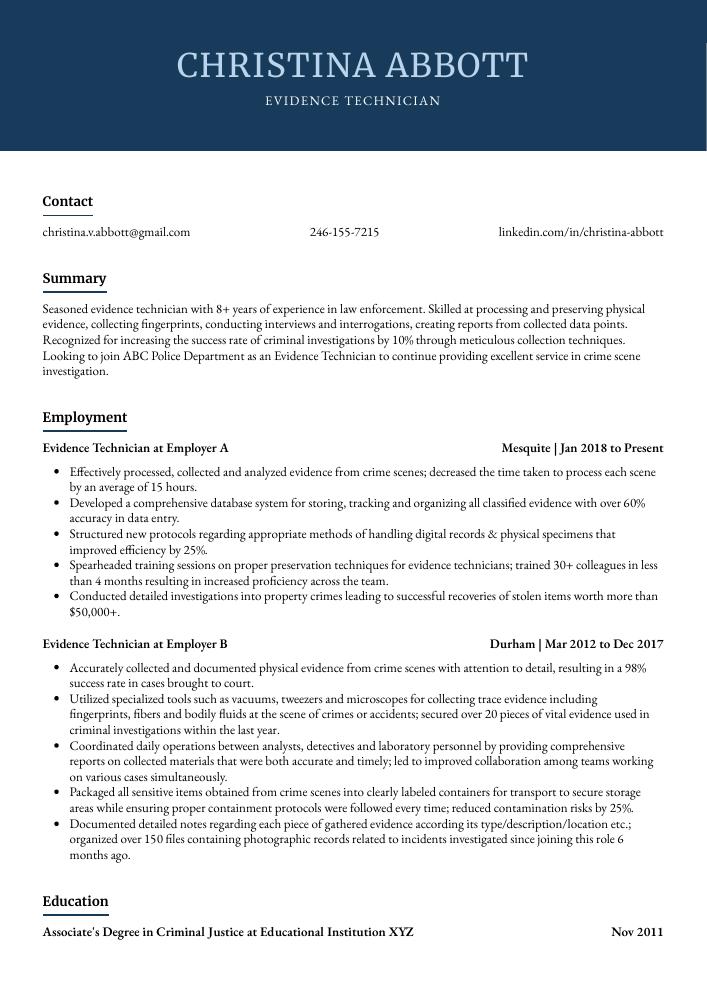Evidence Technician Resume Guide
Evidence Technicians are responsible for collecting, preserving and analyzing physical evidence at crime scenes. They document the scene by taking photographs, making sketches and creating written reports of their findings. Evidence Technicians also collect items such as fingerprints, weapons or clothing that may have been left behind at a crime scene. Finally, they help to process evidence in laboratories to identify potential suspects or links between different crimes.
Your expertise in collecting, documenting and analyzing evidence would be invaluable to any law enforcement facility. To let hiring managers know you’re the one for the job, it’s important that your resume stands out from the crowd.
This guide will walk you through the entire process of creating a top-notch resume. We first show you a complete example and then break down what each resume section should look like.
Table of Contents
The guide is divided into sections for your convenience. You can read it from beginning to end or use the table of contents below to jump to a specific part.
Evidence Technician Resume Sample
Christina Abbott
Evidence Technician
[email protected]
246-155-7215
linkedin.com/in/christina-abbott
Summary
Seasoned evidence technician with 8+ years of experience in law enforcement. Skilled at processing and preserving physical evidence, collecting fingerprints, conducting interviews and interrogations, creating reports from collected data points. Recognized for increasing the success rate of criminal investigations by 10% through meticulous collection techniques. Looking to join ABC Police Department as an Evidence Technician to continue providing excellent service in crime scene investigation.
Experience
Evidence Technician, Employer A
Mesquite, Jan 2018 – Present
- Effectively processed, collected and analyzed evidence from crime scenes; decreased the time taken to process each scene by an average of 15 hours.
- Developed a comprehensive database system for storing, tracking and organizing all classified evidence with over 60% accuracy in data entry.
- Structured new protocols regarding appropriate methods of handling digital records & physical specimens that improved efficiency by 25%.
- Spearheaded training sessions on proper preservation techniques for evidence technicians; trained 30+ colleagues in less than 4 months resulting in increased proficiency across the team.
- Conducted detailed investigations into property crimes leading to successful recoveries of stolen items worth more than $50,000+.
Evidence Technician, Employer B
Durham, Mar 2012 – Dec 2017
- Accurately collected and documented physical evidence from crime scenes with attention to detail, resulting in a 98% success rate in cases brought to court.
- Utilized specialized tools such as vacuums, tweezers and microscopes for collecting trace evidence including fingerprints, fibers and bodily fluids at the scene of crimes or accidents; secured over 20 pieces of vital evidence used in criminal investigations within the last year.
- Coordinated daily operations between analysts, detectives and laboratory personnel by providing comprehensive reports on collected materials that were both accurate and timely; led to improved collaboration among teams working on various cases simultaneously.
- Packaged all sensitive items obtained from crime scenes into clearly labeled containers for transport to secure storage areas while ensuring proper containment protocols were followed every time; reduced contamination risks by 25%.
- Documented detailed notes regarding each piece of gathered evidence according its type/description/location etc.; organized over 150 files containing photographic records related to incidents investigated since joining this role 6 months ago.
Skills
- Evidence Collection and Preservation
- Crime Scene Photography
- Fingerprinting and Identification
- Report Writing
- Computer Forensics
- Chain of Custody Procedures
- Courtroom Testimony
- Evidence Analysis
- Laboratory Techniques
Education
Associate’s Degree in Criminal Justice
Educational Institution XYZ
Nov 2011
Certifications
Evidence Collection and Preservation Technician
International Association for Identification
May 2017
1. Summary / Objective
A resume summary/objective is like a movie trailer – it gives the hiring manager an overview of who you are and why they should consider you for the evidence technician position. In this section, emphasize your experience collecting, preserving, and analyzing physical evidence from crime scenes; highlight any special certifications or awards that demonstrate your proficiency in this field; and talk about how you have gone above-and-beyond to ensure accuracy while handling sensitive materials.
Below are some resume summary examples:
Amicable and organized evidence technician with 5+ years of experience in crime scene investigations. Highly skilled at collecting, preserving and documenting critical evidence to help police officers build a case against criminals. At XYZ Police Department, conducted over 50 successful investigations that resulted in the arrest of suspects responsible for major crimes. Received commendations from senior officers for my dedication and attention to detail during each investigation.
Talented evidence technician with 5+ years of experience in forensic science and crime scene investigation. Proven success collecting, processing, preserving, and analyzing evidence for legal proceedings at XYZ Agency. Skilled in operating laboratory equipment to identify fingerprints and trace DNA samples while maintaining meticulous records of all findings. Looking to bring expertise to ABC Agency as a Crime Scene Investigator/Evidence Technician.
Well-rounded evidence technician with 8+ years of experience in the field. Skilled at collecting, preserving, and analyzing evidence to support investigations conducted by police or other law enforcement agencies. At XYZ Police Department, provided valuable insight into criminal cases which led to the arrest of multiple suspects. Demonstrated excellent attention to detail while handling sensitive materials such as firearms, drugs and DNA samples.
Committed evidence technician with 8+ years of experience in forensic and laboratory settings. Adept at collecting, preserving, packaging, and analyzing evidence for criminal investigations. Skilled in the use of advanced equipment including microscopes and spectrometers. At XYZ Police Department contributed to solving 20 cases by recovering fingerprints from crime scenes and providing valuable information on suspects’ identities.
Skilled evidence technician with 8+ years of experience collecting, organizing, and preserving physical evidence for criminal investigations. Proven track record of handling delicate situations with the utmost discretion while ensuring accurate procedure protocols are followed at all times. Seeking to join ABC Law Enforcement Agency as an Evidence Technician to help solve complex cases within its jurisdiction.
Passionate and detail-oriented evidence technician with 3+ years of experience in the law enforcement field. Experienced in collecting, preserving and cataloging physical evidence for investigations. At XYZ Police Department, successfully collected, analyzed and stored over 500 pieces of criminal evidence. Known for being able to work independently while still following established procedures and regulations.
Reliable and detail-oriented evidence technician with 8+ years of experience processing and analyzing physical evidence. Looking to join ABC Labs as an evidence technician, where I can use my knowledge in laboratory safety protocols and forensic techniques to help solve complex criminal cases. My past accomplishments include a 15% decrease in contamination rates for collected samples.
Accomplished evidence technician with 5+ years of experience in evidence collection, analysis, and documentation. Committed to upholding the highest standards for data integrity and accuracy. Seeking an opportunity at ABC Company to utilize my expertise in processing evidence according to established protocols while helping ensure justice is served accurately and efficiently.
2. Experience / Employment
In the experience section, you should provide details on your employment history. This section should be written in reverse chronological order, with the most recent job listed first.
When describing what you did at each role, stick to bullet points as much as possible; this makes it easier for the reader to take in the information quickly. When writing out these bullets, make sure that they are detailed and include quantifiable results where applicable.
For example, instead of saying “Collected evidence,” you could say “Successfully collected over 500 pieces of evidence from crime scenes per year using a range of techniques such as fingerprinting and photography.”
To write effective bullet points, begin with a strong verb or adverb. Industry specific verbs to use are:
- Collected
- Analyzed
- Preserved
- Processed
- Recorded
- Examined
- Photographed
- Testified
- Documented
- Assessed
- Inspected
- Packaged
- Labeled
- Transported
- Secured
Other general verbs you can use are:
- Achieved
- Advised
- Compiled
- Coordinated
- Demonstrated
- Developed
- Expedited
- Facilitated
- Formulated
- Improved
- Introduced
- Mentored
- Optimized
- Participated
- Prepared
- Presented
- Reduced
- Reorganized
- Represented
- Revised
- Spearheaded
- Streamlined
- Structured
- Utilized
Below are some example bullet points:
- Successfully collected, secured and documented over 200 pieces of evidence from crime scenes with accuracy and precision in a 4-month period.
- Achieved 100% compliance to departmental policies when handling evidence; employed advanced methods in preserving the chain of custody for further investigation & processing.
- Collected DNA samples, fingerprints, weapons and other physical objects using specialized equipment such as magnifying glasses and tweezers while adhering to safety protocols at all times.
- Transported sensitive items (documents, video recordings etc.) between police stations securely within established timeframes; expedited laboratory analysis processes by obtaining necessary paperwork promptly on arrival at destination sites.
- Expedited case proceedings by quickly organizing exhibits & providing expert testimony during court hearings; helped close 20+ cases successfully within 6 months through timely submission of reports & findings for review purposes.
- Reduced evidence backlog by 63% within six months, resulting in improved efficiency of the department.
- Assessed and documented physical evidence collected at crime scenes, adhering to all procedural guidelines while maintaining chain-of-custody protocols.
- Meticulously analyzed and processed over 500 pieces of forensic evidence per month; identified potential DNA samples as well as latent fingerprints from a variety of surfaces with accuracy rates above 90%.
- Advised police officers on proper collection techniques for trace evidence such as fibers, soil or glass fragments; conducted additional laboratory tests when necessary to determine further details about the case material.
- Improved quality control processes regarding handling procedures for seized items that were used during court proceedings; tracked inventory movement using digital databases and secured storage facilities with 99% accuracy rate.
- Participated in over 300 crime scene investigations, collecting and preserving evidence such as fingerprints, hair samples, blood stains & fibers for further examination.
- Efficiently organized and catalogued all items of evidence into the department’s computer system with 100% accuracy in tracking information; reduced search time by 45%.
- Recorded precise measurements from crime scenes to create detailed sketches of the areas used during reconstructions; identified 15 suspects with these techniques resulting in successful convictions.
- Analyzed collected physical evidence using specialized forensic tools such as DNA tests and microscopes while ensuring compliance with relevant laws; uncovered 5 new leads which were integral to solving cases quickly.
- Mentored 8 junior technicians on effective methods of locating, recording and analyzing evidence at crime scenes leading to a 10% increase in arrests for unsolved crimes within 3 months.
- Revised evidence collection protocols to ensure accuracy and completeness of collected items; increased evidence processing speed by 40%.
- Competently processed over 200 pieces of physical evidence per day, analyzing their relevance in the investigation process with a high level of accuracy.
- Photographed crime scenes & evidence using digital cameras and specialized equipment; managed an inventory of up-to-date photographic supplies for use in field operations.
- Examined trace elements such as fingerprints, footprints, fibers and other small objects from crime scenes to build comprehensive criminal profiles; identified suspects in 15 cases within 1 year period through meticulous examination work.
- Demonstrated excellent organizational skills when cataloguing all recovered materials according to specified criteria while maintaining chain-of-custody protocol at all times; reduced misplacement rate by 30%.
- Formulated evidence packages of over 300 items for police investigations, labeling and cataloging each item accurately while adhering to all chain-of-custody procedures.
- Represented the department in court proceedings by providing testimonies on evidence handling practices; successfully secured convictions with a 92% success rate.
- Labeled and properly documented over 400 pieces of physical evidence per month according to department standards, ensuring accuracy in all reports written up for every case handled.
- Presented key findings from forensic analysis at professional conferences across five states, resulting in an increase of 20% in overall crime clearance rates within two years following presentations made.
- Thoroughly inspected crime scenes to collect fingerprints, blood samples or other traceable materials which were then processed into laboratory results; identified 50+ suspects linked to ongoing cases with 95% accuracy rate.
- Prepared evidence for laboratory analysis and courtroom presentations, including cataloging, packaging and labeling 600+ items of evidence per month.
- Secured physical evidence from crime scenes in an organized manner; reduced contamination risks by 30%.
- Preserved microscopic samples of hair strands, fibers, weapons and other objects found at the scene using specialized equipment; identified key pieces of evidence that led to successful conviction rates of 80%+.
- Resourcefully used digital imaging technology to capture high-resolution photographs/videos that documented chain-of-custody protocols accurately on 500+ occasions during investigation periods.
- Streamlined data entry processes into electronic case management systems; decreased manual paperwork filing time by 2 hours a day on average.
- Reorganized the evidence storage system to improve workflow efficiency, reducing retrieval times by 30%.
- Proficiently collected and documented physical evidence from crime scenes using the latest forensic techniques; analyzed more than 500 pieces of data over two years with an accuracy rate of 94%.
- Testified in court as a fact witness on 50+ occasions related to criminal cases, providing authoritative statements that were instrumental in obtaining convictions for perpetrators.
- Optimized the use of digital record-keeping systems to ensure all case files and documents remained organized, secure and up-to-date at all times.
- Introduced new procedures for processing evidence samples which improved overall laboratory productivity by 25% while saving $1,500 per annum in operational costs.
- Inspected and collected evidence from crime scenes, including fingerprints, firearms and other physical objects; cataloged over 200 pieces of evidence per month across multiple cases.
- Compiled detailed reports of all findings along with photographs to create an accurate record for use in court proceedings; helped convict 4 major criminals within the first 6 months on the job.
- Facilitated successful transfer of sensitive materials by adhering to proper chain-of-custody procedures and ensuring that all evidence was properly logged into secured databases with 100% accuracy rate.
- Actively communicated with detectives regarding any updates or changes in status related to case investigations, thereby helping close 8 unsolved cases within 2 years at this position.
3. Skills
Skill requirements will differ from employer to employer – this can easily be determined via the job advert. Organization ABC may require the candidate to be proficient in using a specific type of evidence-collection software, while Organization XYZ may need someone with experience handling firearms.
It is important to tailor your skills section accordingly because many employers use applicant tracking systems these days that scan resumes for certain keywords before passing them on to a human. If you don’t include those relevant words and phrases, then it’s likely your resume won’t even get seen by an actual person!
Once listed here, you can further elaborate on your skillset by discussing it in more detail in other areas such as the summary or experience sections.
Below is a list of common skills & terms:
- Chain of Custody Procedures
- Computer Forensics
- Courtroom Testimony
- Crime Scene Photography
- Evidence Analysis
- Evidence Collection and Preservation
- Fingerprinting and Identification
- Interrogation Techniques
- Laboratory Techniques
- Report Writing
4. Education
Mentioning your education on your resume will depend on how far along you are in your career. If you just graduated and have no prior experience, include an education section below your resume objective. However, if you have years of work experience as an evidence technician to showcase, it is perfectly acceptable to omit the education section altogether.
If including a formal educational background is necessary for the job or desired by employers, try mentioning courses related to evidence gathering and processing that demonstrate expertise in this field.
Associate’s Degree in Criminal Justice
Educational Institution XYZ
Nov 2011
5. Certifications
Certifications are an effective way to demonstrate your proficiency and expertise in a certain field. They can also be used to show that you have taken the initiative to stay up-to-date with industry trends and developments.
Including certifications on your resume is a great way of showing potential employers that you are serious about developing yourself professionally, which could give you an edge over other applicants.
Evidence Collection and Preservation Technician
International Association for Identification
May 2017
6. Contact Info
Your name should be the first thing a reader sees when viewing your resume, so ensure its positioning is prominent. Your phone number should be written in the most commonly used format in your country/city/state, and your email address should be professional.
You can also choose to include a link to your LinkedIn profile, personal website, or other online platforms relevant to your industry.
Finally, name your resume file appropriately to help hiring managers; for Christina Abbott, this would be Christina-Abbott-resume.pdf or Christina-Abbott-resume.docx.
7. Cover Letter
Including a cover letter with your job application is a great way to make an impression on the hiring manager. Cover letters are short documents, usually two to four paragraphs long and provide additional information about who you are and why you’d be a good fit for the role.
Cover letters also give recruiters insight into how well-written and articulate you are as a professional. Even though not all jobs require one, taking the time to craft an effective cover letter can go a long way in helping you stand out from other applicants.
Below is an example cover letter:
Dear Kara,
I am writing to apply for the position of Evidence Technician with the San Francisco Police Department. I have a Bachelor’s degree in Criminal Justice and three years of experience working as an evidence technician with the Santa Clara Police Department. In my current role, I am responsible for collecting, processing, and storing evidence from crime scenes. I have experience using a variety of software programs to track and manage evidence, and I am confident that I can do the same for your department.
In addition to my education and professional experience, I have personal qualities that make me well-suited for this job. I am detail-oriented and organized, which is essential for keeping accurate records of evidence. I also have excellent communication skills, which are necessary for dealing with police officers, witnesses, and victims who may be traumatized by their experiences. Finally, I am physically fit and able to lift heavy objects or stand for long periods of time if necessary.
I believe that my education, experience, and personal qualities make me an ideal candidate for the position of Evidence Technician with your department. If you have any questions about my qualifications or would like to discuss my application further, please do not hesitate to contact me at [phone number] or [email address]. Thank you very much for your time and consideration; I look forward to hearing from you soon!
Sincerely,
Christina
Evidence Technician Resume Templates
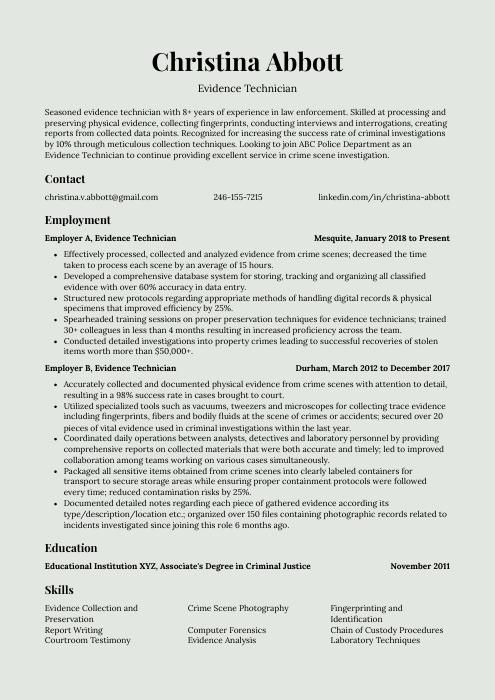 Saola
Saola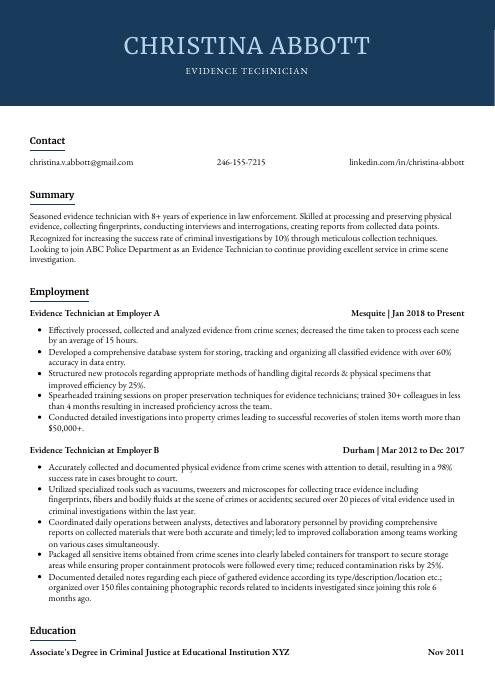 Bonobo
Bonobo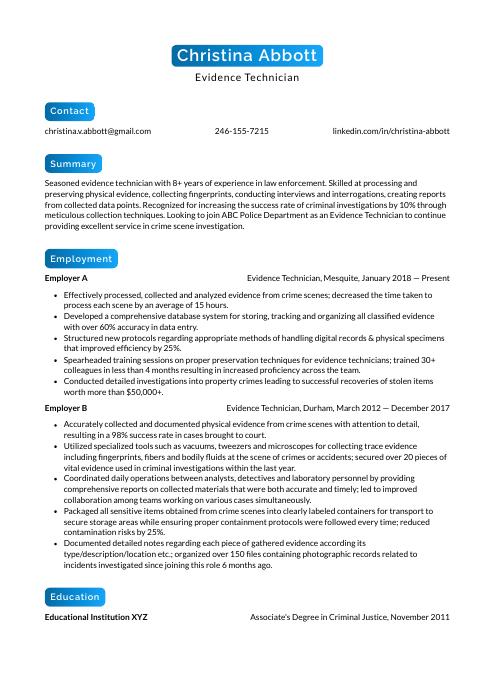 Kinkajou
Kinkajou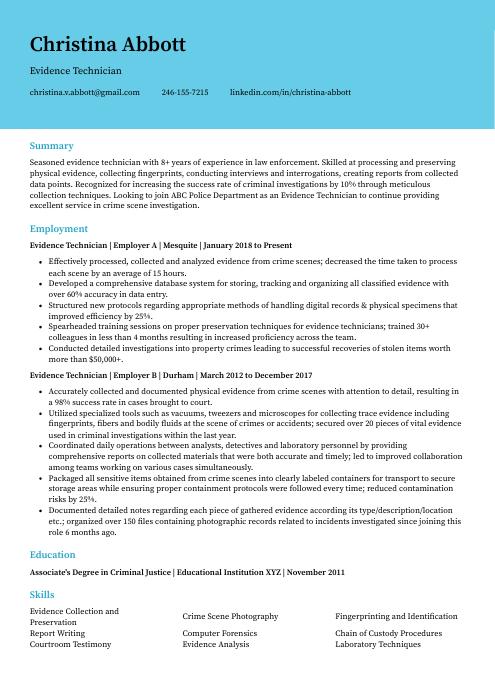 Dugong
Dugong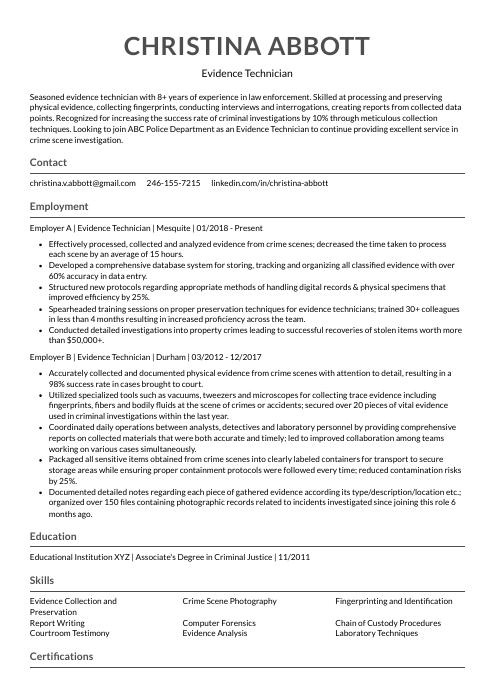 Indri
Indri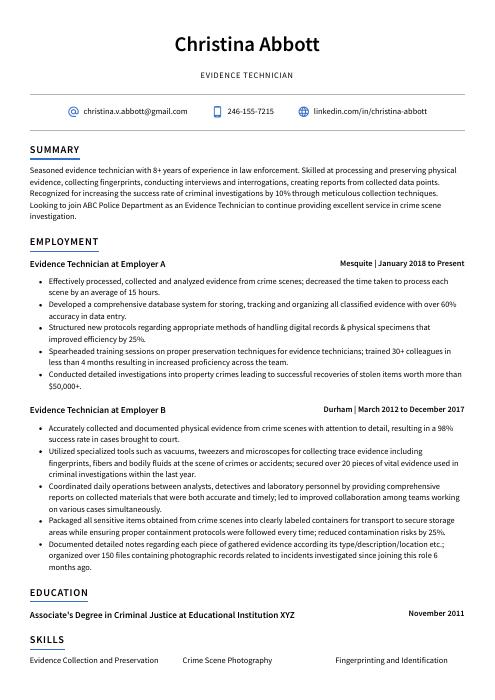 Axolotl
Axolotl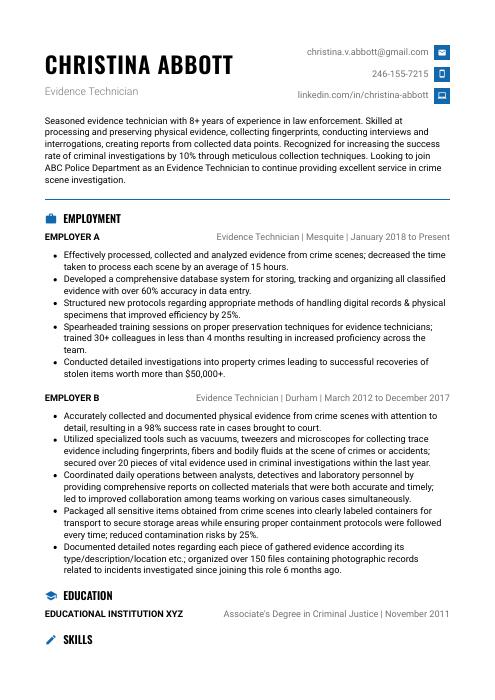 Echidna
Echidna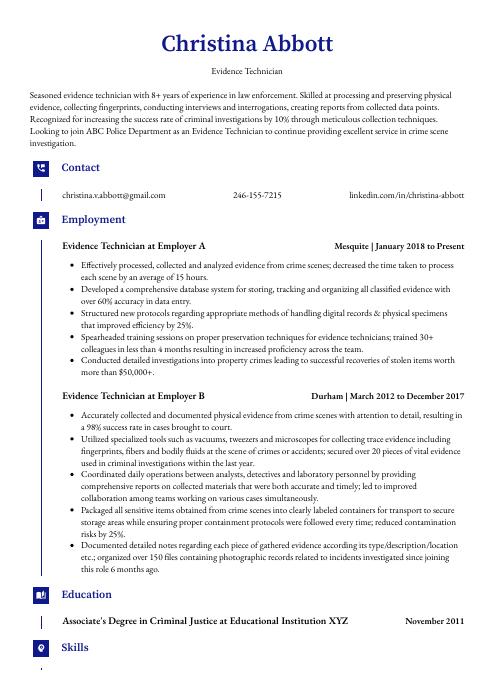 Gharial
Gharial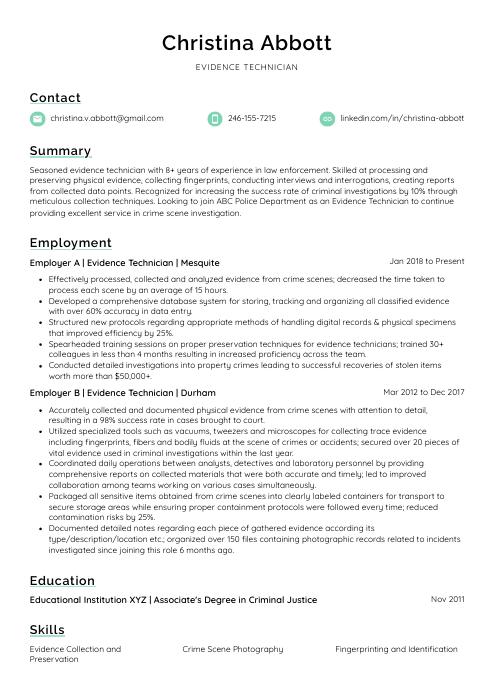 Lorikeet
Lorikeet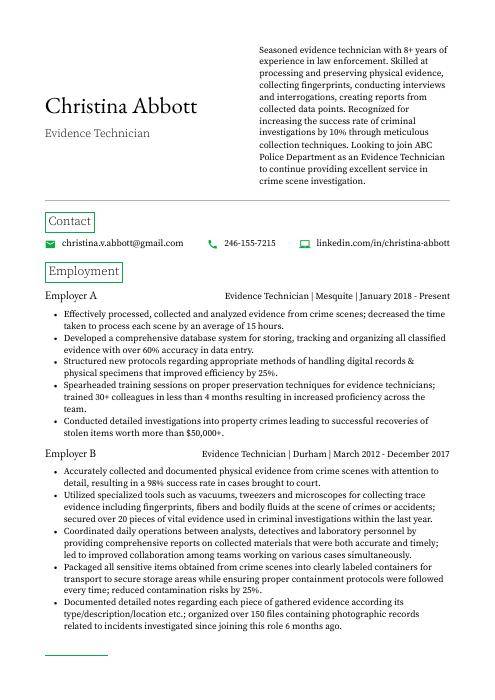 Quokka
Quokka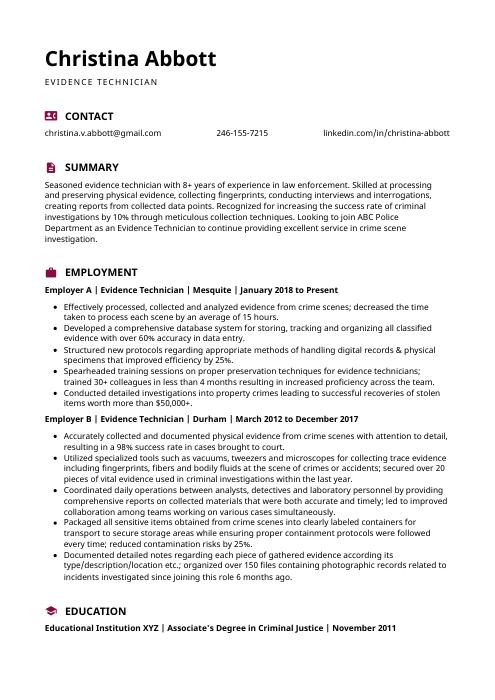 Hoopoe
Hoopoe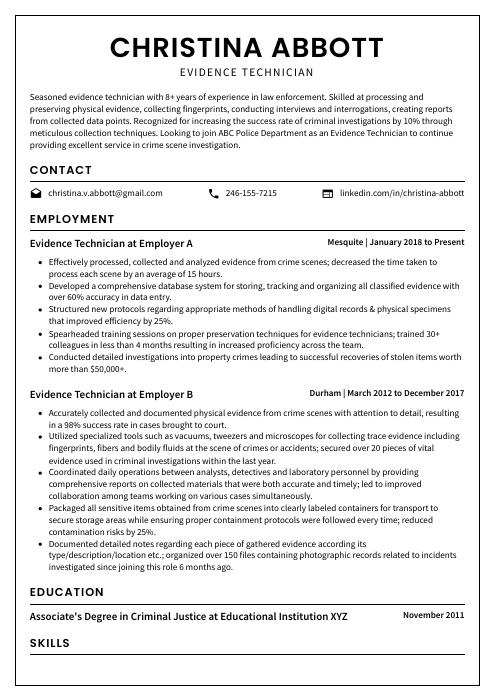 Cormorant
Cormorant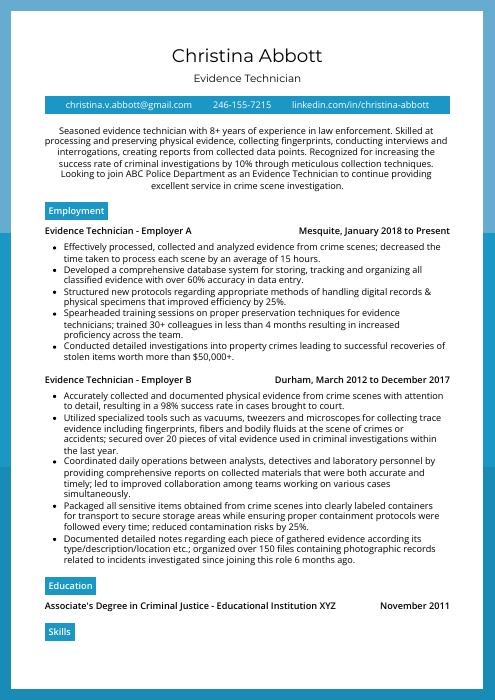 Rhea
Rhea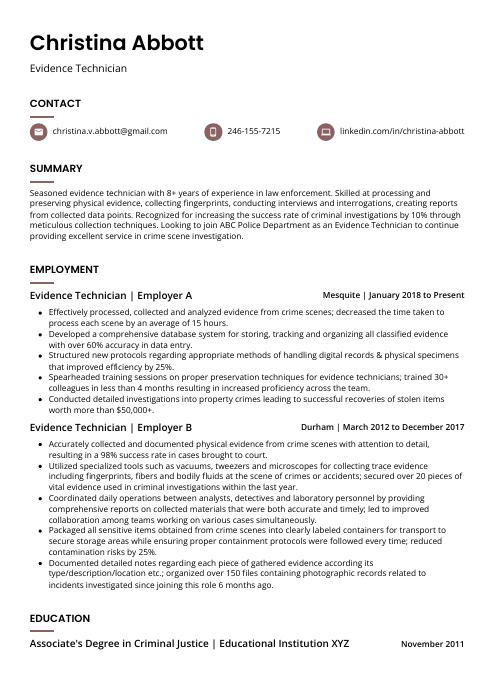 Fossa
Fossa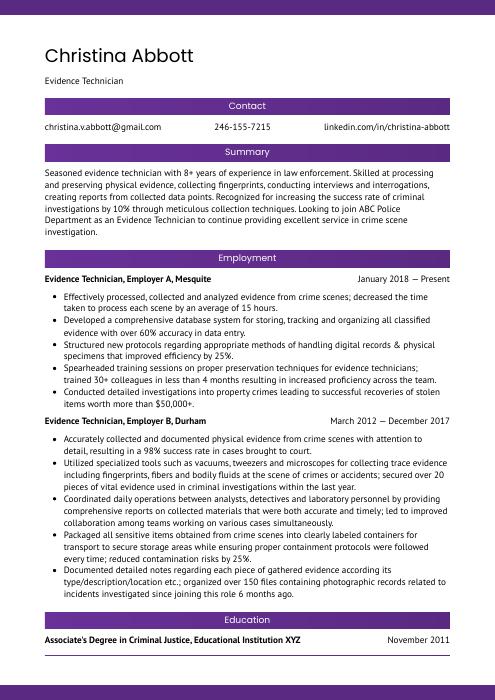 Jerboa
Jerboa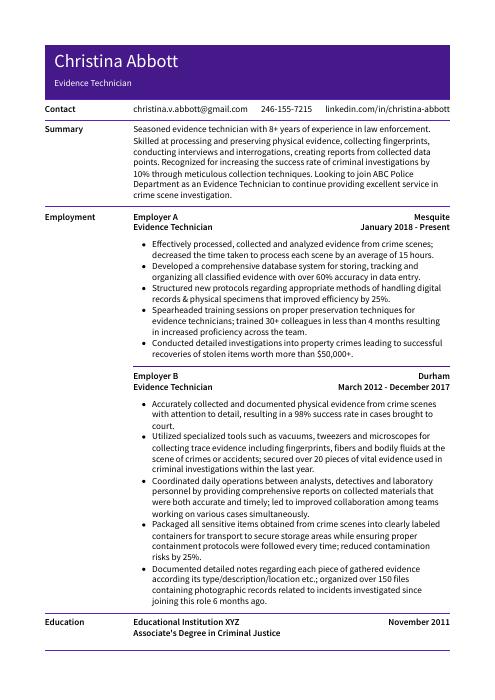 Pika
Pika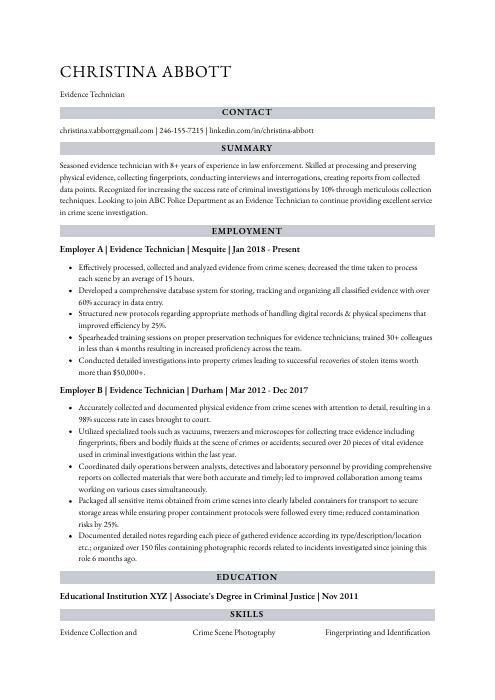 Numbat
Numbat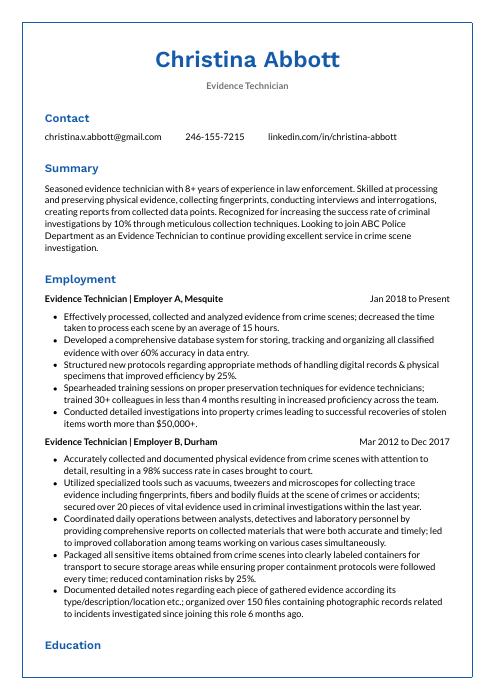 Markhor
Markhor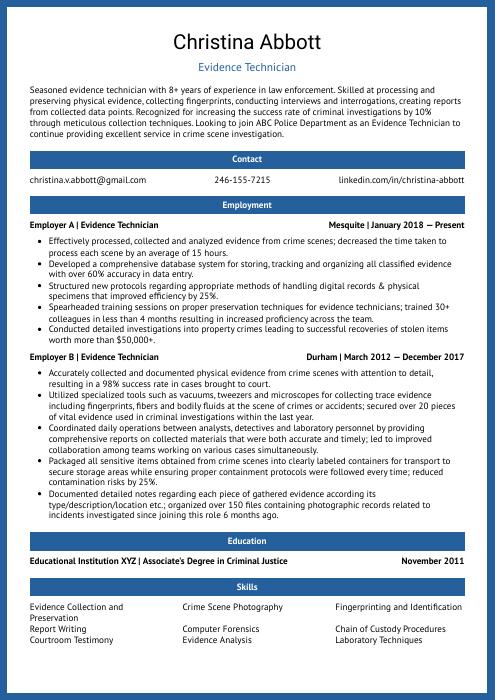 Ocelot
Ocelot Rezjumei
Rezjumei
